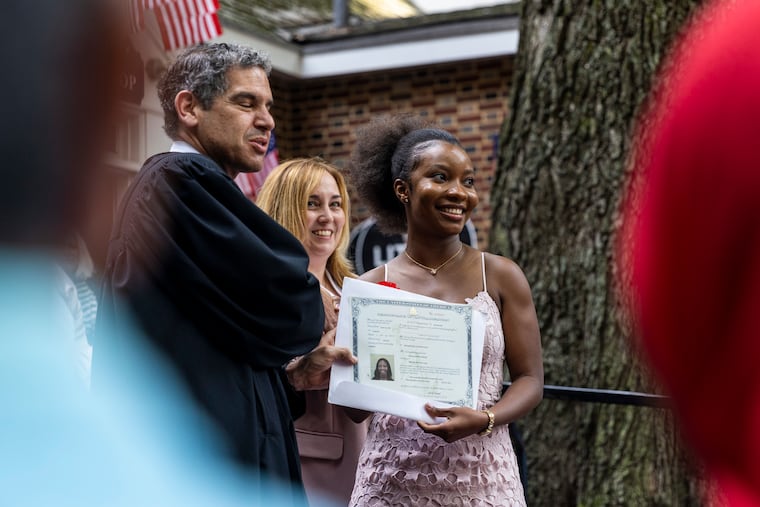More detentions, deportations, abuse: The challenges Black immigrants face
During Black History Month, we urge Philadelphians to recognize the diversity of Black Philadelphia and pay attention to the unique plight of Black immigrants.

Philadelphia’s Black immigrant population has been growing. According to the Pew Research Center, some 120,000 Black immigrants now call Philly home. Since the 1990s, African immigrants have comprised a large portion of this migration, arriving from Liberia, Nigeria, Ghana, Ivory Coast, and other countries throughout the continent. Black immigrants also arrive in significant numbers from Jamaica, Haiti, and other Caribbean and Latin American countries. They are among the arrivals who have helped remake Philadelphia’s commerce, culture, and community.
Today, one in 10 Black people living in the U.S. is an immigrant.
“One in 10 Black people living in the U.S. is an immigrant.”
Yet the stories we tell about U.S. immigration often downplay the experiences of Black immigrants. And given the racist underpinnings of the U.S. immigration system, and its entanglements with the criminal legal system, Black immigrants face unique challenges compared with other immigrants, including overrepresentation in removal proceedings, a higher chance of abuse (and more time in solitary confinement) while being detained, and a higher rate of deportation relative to other immigrants.
These challenges are exacerbated by the fact that there is no guarantee of legal representation in immigration hearings. This despite the dire consequences of deportation: banishment from one’s home, separation of family, and possible persecution upon return to the country of origin.
Philadelphia must begin to address the specific challenges facing Black immigrants, including ensuring that each has access to legal representation when they are detained.
Among African immigrants, Liberians are the largest nationality in the city. Liberia and Philadelphia have a long relationship, dating back to the early 19th century. But Philadelphia’s now bustling Liberian community is rooted in the displacements caused by the Liberian civil war in the 1990s, which claimed roughly 250,000 lives.
While some Liberians — many of whom are refugees or asylum-seekers — gained permanent status and U.S. citizenship, others were given more temporary forms of status. Some grew up thinking that, as children of refugees, they had permanent legal status, only to find later that wasn’t the case.
» READ MORE: Who is Black in America? Ethnic tensions flare between Black Americans and Black immigrants.
One of us is an attorney at the Nationalities Service Center, and one of our clients is a man who had been kidnapped by a rebel group at the age of 6, tortured by warlords, and made to witness atrocities. He and his family fled from Liberia to a refugee camp in Ghana before being resettled in West Philadelphia in 2003. When he and his family came to the United States, our client was a teenager, still suffering from that trauma. As a recently resettled refugee, he did not understand the U.S. legal system and did not know that refugees must seek to adjust their status to become lawful permanent residents, and then ultimately citizens. His parents became citizens, but, like many other refugee children of Liberian parents, our client did not.
Due to his lack of permanent status, our client ended up being placed before an immigration judge in 2008, where he faced the threat of deportation. At the time, Pennsylvania did not provide any pro bono legal services to individuals in detention, and he was forced to represent himself, testify at length about the torture he had experienced, and proceed without an assessment of how trauma affected his ability to participate in his case.
He was ordered deported. However, he was released after six months in detention to reside and work in the U.S. while the government attempted to secure travel documents for him to return to Liberia. He continued building his life in Philadelphia, attending his immigration check-ins, working in delivery and food service jobs, and starting a family.
Then, in 2022, he was detained once again and told he would be deported.
Thankfully, his story ends better than others. He obtained a pro bono lawyer from the Pennsylvania Immigrant Family Unity Project, a collaborative that includes both of our organizations, and promotes universal representation for detained immigrants. He met his counsel a few days before Christmas in 2022, two weeks before the government planned to deport him. His lawyer stopped his imminent deportation and asked the judge to reopen his case in light of the serious due process violations that occurred at his prior hearing. The judge agreed, and our client will be able to get a full and fair hearing before the Immigration Court, with a lawyer by his side.
During Black History Month, we urge Philadelphians to recognize the diversity of Black Philadelphia and to pay attention to the unique challenges faced by Black immigrants. Challenging the anti-Black racism that pervades our society, including our immigration system — and ensuring every immigrant has access to representation — is a step toward liberation for all.
Eric Edi is the executive director of the Coalition of African Communities. Lilah Thompson is a senior staff attorney at the Nationalities Service Center.